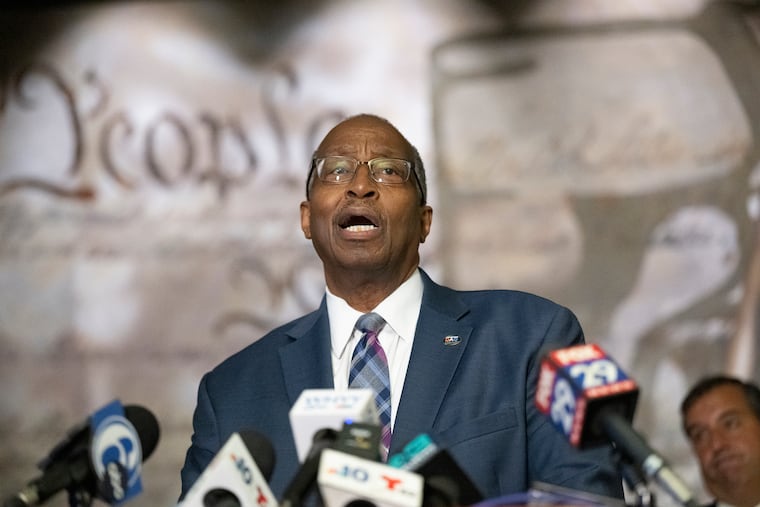A Philly teen who wanted to be a terrorist bomb maker had conducted explosive tests near his house, authorities say
Muhyyee-Ud-din Abdul-Rahman, now 18, conducted more than a dozen tests on homemade bombs near his family’s house in Wynnefield while aspiring to become a bombmaker in Syria, authorities said.

A Philadelphia man who was charged as a teenager last year with supporting foreign terrorist organizations had conducted more than a dozen tests on homemade bombs near his family’s house in the city’s Wynnefield section. and had begun planning to travel to Syria in hopes of becoming a bomb maker there, authorities said Monday.
Muhyyee-Ud-Din Abdul-Rahman, now 18, was close to being able to detonate bombs with a blast radius of several hundred yards, said First Assistant District Attorney Robert Listenbee. And as Abdul-Rahman’s knowledge of explosives increased — and as he took steps toward flying overseas, including by acquiring a passport — he also conducted internet searches that indicated at least some interest in striking targets closer to home, Listenbee said, including by researching local nuclear power plants, the Philly Pride parade, and the Army-Navy football game.
The searches “clearly demonstrated his commitment for preparing for war,” Listenbee said. “These are very frightening searches.”
Abdul-Rahman also tried, unsuccessfully, to recruit at least one local friend to join him in his extremist activities, Listenbee said, and he traded messages online with people “all over the world” featuring propaganda and videos “that would tend to radicalize young people.”
The details were revealed as Listenbee said a city judge had agreed that Abdul-Rahman should be tried as an adult. Abdul-Rahman, who was 17 when he was arrested, faces charges including possessing weapons of mass destruction, conspiracy, arson, and causing or risking a catastrophe, and bail was set at $5 million, Listenbee said.
Abdul-Rahman’s case had been progressing through the juvenile system since last year because of his age at the time of his arrest. But prosecutors had argued that the case should be transferred to the adult system because of the gravity of the allegations, and because the juvenile system was not equipped to provide adequate consequences or rehabilitation, Listenbee said.
Federal authorities were also heavily involved in the investigation, but juveniles are rarely charged in federal courts, which, unlike state courts, do not have a dedicated system for handling cases involving young people. A spokesperson for the U.S. Attorney’s Office declined to comment on whether prosecutors there are considering filing federal charges in the matter.
Attempts to reach Abdul-Rahman’s attorney or his relatives — including his father, Qawi Abdul-Rahman, a local criminal defense attorney who previously ran for judge — were unsuccessful.
Listenbee, meanwhile, said at least one key aspect of the case remains a mystery: how and why Abdul-Rahman became so radicalized to begin with. He’s an intelligent young man who had been offered a scholarship to college for wrestling, Listenbee said — but after his arrest, he told authorities he had planned to abandon that future in favor of building explosives for extremist groups.
“He was ready to leave his family, his friends, his school, and his wrestling team,” Listenbee said. “He had no intention of going to college in the United States, and he knew that if he traveled to Syria, he would never be allowed to come back.”
Abdul-Rahman first came to the attention of the FBI through contacts he had made over social media with members of a Syrian group known as Katibat al Tawhid wal Jihad, or KTJ, authorities said last year. That group had claimed affiliation with ISIS and claimed responsibility for deadly attacks in Russia and Kyrgyzstan.
His WhatsApp account also displayed banners associated with other terrorist groups, authorities said last year, including the Chechnya-based Riyad-us-Saliheen Brigade of Martyrs. And Listenbee added that at one point, Abdul-Rahman’s WhatsApp profile picture was a photo of Osama bin Laden.
As agents surveilled Abdul-Rahman after learning of his online activities, authorities said, they also began observing him buying military and tactical gear as well as materials that could be used in homemade bombs.
Listenbee said authorities then found bomb-making materials in his trash, and after he was taken into custody, he admitted having conducted 12 to 20 bomb tests in wooded areas near his house. Listenbee added that Abdul-Rahman told investigators he was just a few days away from being able to test larger explosives, including pressure cooker bombs or even a so-called TATP bomb, which some law enforcement refer to as the “mother of Satan.”
“This was a major threat to our community,” Listenbee said.
Abdul-Rahman has spent the last year in custody in the Juvenile Justice Services Center as his case has progressed through juvenile court. Listenbee said that the hearing to move the prosecution to the adult system lasted over four days, and that a judge “did not believe” testimony from Abdul-Rahman that he had since renounced his views and no longer wanted to become a bomb maker.
“He was found to be not amenable to treatment, supervision, and rehabilitation in the juvenile justice system,” Listenbee said.
It was not immediately clear Wednesday when Abdul-Rahman was next due in court. Prosecutors said that if convicted, he faces a maximum sentence of 24 to 48 years in prison.